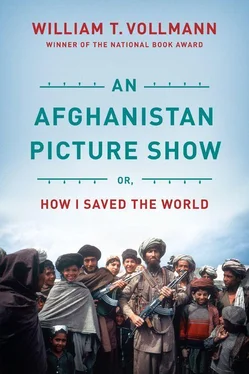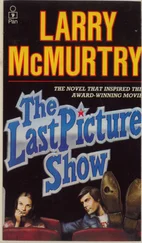“Mr. Austrian Relief Committee,” said the Young Man, “go take a flying Anschluss .” —No, he didn’t say anything. He rubbed his aching belly.
Actually it was not a particularly smart idea for him to be going to Afghanistan. He admitted that. The General had said that the way in was very short and easy. All they had to do was go over a hill and they would be there. That did not sound so bad. But he wished that he felt stronger. The Norwegian girl was laughing, calling, playing volleyball … They saw no villagers.
In the morning they went out to the camps. Driving through the village, he thought that people were pointing at him and trying to make him look at them.
AN AFGHANISTAN PICTURE SHOW [2]
A refugee camp, it seemed, could be described as a place where two choices were available to the inhabitants: get sick or do nothing. Some children had school of a sort; some men sold soft drinks and fruit; but the keynote was definitely idleness in that sun that he could not long forget because his throat would get dusty and his tongue would get dry and the heat left him dizzy and sick and dreaming of drinking a dozen Sprites. (Could it be that he was not suited for this kind of work?) Here sat the lines of men outside the malaria treatment tent: today was men’s day; tomorrow would be women’s and children’s day. Here two little girls played listlessly in a wilderness of big blue drums; tents stretched behind them toward the purple mountains. Tawny supply tents, unpleasantly hot to the touch, sliced off long rectangles of dry shadow unblinking behind eyelashes of guy ropes. Narrow paths (ankle-deep trenches bordered by stones) led between them. The sky was a dusty cloudless blue. But there was one cool place. Sick refugees stood there. The wide dark leaves of the tree behind them caught the sunlight like dust. Men and boys stood leaning around the square waist-high reservoir (which had worms in it), in whose water their faces and the tree were reflected, and they were all looking the Young Man in the face. (Only a mullah in white looked away, smiling tranquilly down at the ground as the Young Man got out his camera.) A dark-eyed young man thrust broad shoulders forward to look at the foreigner; beside a diamond-patterned water jug, young boys peeped. Closest to the Young Man was a boy in a silver skullcap. His lips were parted; his eyes were big and sad. Between two fingers he held up a scrap of paper with printed words on it — Pushtu words, though what they were the Young Man would never know. The paper had been torn right through some of the words. Whatever the message said, it was incomplete.
And this would happen again, in Afghanistan where a man stood before him, tall, sad, imposing in vest and cartridge belt, and the clean creek that ran between houses gurgled very quietly (it was early morning), and wide trees roofed that dirt street with shade as the man stood there, not going away because he had something to show him, and he had dark eyes and brows and a rich dark mustache and his eyes were large and there was not a line in his face, and he wore a black cap. In his hand he held a medal, by a little chain. He lifted the medal to his breast and stood there holding it so that the Young Man could see. Beside him stood a young boy, also wearing a black cap. His son? The boy did not look at the medal. He looked only into the Young Man’s eyes, as his father did, and the boy’s arms fell away from him as if he were almost shrugging, but the expression on his face was so very serious; and this was one of the many frames in the Afghanistan Picture Show which the Young Man never understood: it belonged with those other mysteries, such as who the Brigadier was, and which faction was the best, and how serious corruption was in the refugee camps, and why the Roos had invaded Afghanistan, and why the Young Man had invaded Afghanistan — but how strange and sad it was, that the man with the medal wanted him to understand something, and he would never ever understand it.
STATEMENT OF HASSAN GHULAM, A.R.C.
“Could you tell me a little about your operations?” said that one-man freakshow, the Young Man, switching on the tape recorder. The interview was conducted in German.
“We work in two refugee camps,” said Mr. Ghulam, “and the total number of refugees there is around fifty thousand. In each camp we have a medical team, consisting of a female doctor, a male doctor, with a sickbed for men and one for women.” (The woman doctor he had seen at work, with the soft white wrappings about her head, leaning forward, pursing her lips as she brought the cool stethoscope against the little boy’s chest and the boy turned his face against the shoulder of his father, who, wearing a cap that glistened like gilded fish scales, seemed to be concentrating even harder than the doctor; and otherwise, save for a table and the two chairs that the adults were sitting in, the tent was empty, and outside there was only whiteness and heat.) “And we distribute these milk biscuits,” said Ghulam, “and we also give instruction in the schools on basic care and sanitation, and we have maternity programs as well. We speak a great deal with the refugees, and tell them that they are not clean, that they are not washing their clothes, that they are not washing their children, and they ask us: ‘Why should we wash, and how should we wash?’ and we teach them sanitation. There are many sick people, and especially social problems, and they come up to us, and we talk to them. We give the aggressive ones precedence. That is our work.”
The Young Man could not admit that it was not these interviews that were important. Maybe at the time they were important. Maybe the checklists of things done and yet to do were all that mattered, that good action without poetry. How many sick people are there? Do we have enough housing? Yes, these are the most important things, and yet there are new checklists now, and the number of milk biscuits that the Austrian Relief Committee distributed in 1982 carries no more weight now than the Young Man’s flock of hopes and aims that dissipated like all the women who so quickly covered their mouths with their veils when they saw the Young Man approaching; they always saw him coming before the menfolk did.
“What can Americans best do for the refugees?” he asked.
“Well, it is hard to say precisely what is entirely good,” said Ghulam. “But a general principle that one might state for the Americans is that, as they can imagine, they should do what they can to help. And the help should come either directly to our population or through an intermediary, but the more direct the better. And also, of course, they should not make false politics against Russia, here or in Latin America, because they ought to think of the solidarity of all people, and not help to bring about a war.”
STATEMENT OF AFGHAN REFUGEE COMMISSIONER ABDULLAH (PESHAWAR)
The Young Man’s experiences with offices in Pakistan was that the pace of work was not frantic. When he went to the Special Branch of the police station in Peshawar to get the document which he was required to carry as an alien, the police chief and his subordinates all knocked off and had him take snapshot after snapshot of them. They made him promise to send copies. — “We make everybody take pictures, but they never send them to us,” the police chief lamented. — The Young Man did not send his snapshots to them either, because in every one the police chief looked quite sinister in his dark sunglasses. — In the post offices in Karachi and Peshawar, they sent you from window to window whenever they could, opened late, closed early, and took long lunches. To transact business at the office of the state tourist bureau in Peshawar, it was necessary to bang on the door for a long time, because the official, a gentle, boyish-looking fellow with dark hair, would lock the door, turn on the air conditioning, and stretch out on the carpet to sleep away the long, happy day.
Читать дальше












